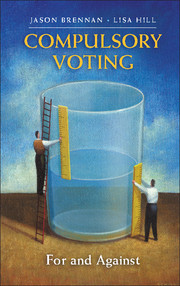Book contents
- Frontmatter
- Contents
- Acknowledgments
- Part I Medicine Worse Than the Disease?
- Part II Compulsory Voting Defended
- 5 Compulsory Voting: Background, Effects, Feasibility, and Basic Premises
- 6 Turnout, Abstention, and Democratic Legitimacy
- 7 Is Compulsory Voting an Unjustified Burden on Personal Autonomy?
- 8 Is Requiring People to Vote Contrary to Democratic Values?
- 9 Conclusion
- Bibliography
- Index
- References
7 - Is Compulsory Voting an Unjustified Burden on Personal Autonomy?
Is There a Right Not to Vote?
Published online by Cambridge University Press: 05 June 2014
- Frontmatter
- Contents
- Acknowledgments
- Part I Medicine Worse Than the Disease?
- Part II Compulsory Voting Defended
- 5 Compulsory Voting: Background, Effects, Feasibility, and Basic Premises
- 6 Turnout, Abstention, and Democratic Legitimacy
- 7 Is Compulsory Voting an Unjustified Burden on Personal Autonomy?
- 8 Is Requiring People to Vote Contrary to Democratic Values?
- 9 Conclusion
- Bibliography
- Index
- References
Summary
Introduction
A common criticism of compulsory voting is that it represents an unwarranted burden on individual liberty. In making this argument, some critics claim that it violates an assumed right not to vote. Obviously, if there is such thing as a right not to vote, compulsory voting is an illegitimate practice.
While there is no doubt that compulsory voting violates the principle of democratic choice, I argue in this chapter that requiring people to vote is a justified burden on personal liberty. I give both rights- and consequence-based reasons for this position while acknowledging that the rights- and consequence-based reasons are somewhat related.
I make three broad arguments from the rights perspective: the first is that because the right to vote partly defines the structure of democratic government, it cannot be waived; in other words, there is no right not to vote. Second, I argue that because voting is the master right that protects all other rights, it should be exercised. Third, although requiring people to vote might violate one interpretation of liberty – negative liberty – it can serve and strengthen a number of other interpretations of liberty, among them nondomination, autonomy, and positive liberty, because of its demonstrated capacity to empower the politically and economically weak. Compulsory voting can therefore be justified as a reasonable infringement of autonomy.
- Type
- Chapter
- Information
- Compulsory VotingFor and Against, pp. 154 - 173Publisher: Cambridge University PressPrint publication year: 2014
References
- 1
- Cited by



